I am using dwm (6.2) window manager and I found a bug which I would love to solve.
Window manager uses "master area" and "stack area" where windows are put:
It is possible to move window at the top of the "stack area" to the bottom of the "master area" using ALT + i. It is also possible to move windows from the bottom of the "master area" back to the top of "stack area" using ALT + d.
Now in this case, if I use ALT + i, layout changes and after the key combination there are two windows in the "master area":
I repeat it again and now there are three windows in the "master area":
I repeat it yet again and now there are three windows in the "master area" which has 100% width:
If I would at this point decide to return windows from the "master area" to the "stack area" I would start pressing ALT + d and windows would imediately return back to the "stack area". This works okay.
But I intentionaly make a mistake and instead press ALT + i again for example three more times. It looks like nothing happens...
But now if I try to return windows from the "master area" to the "stack area" I first need to press ALT + d three more times and nothing will happen! And then finaly, when I press ALT + d for the fourth time, window manager will return the first window from the bottom of the "master area" to the top of the "stack area".
So this is not well thought out and should be considered a bug...
There must be some sort of a counter in the source code which was incremented three more times by pressing ALT + i but it should not increase after all windows are already in the "master area".
In config.def.h source file (www) there is a part of the code where keys are assigned. And here I can see that when user presses ALT + i function incnmaster() is called and is passed an argument .i = +1 (I don't understand this argument).
static Key keys[] = {
/* modifier key function argument */
...
{ MODKEY, XK_i, incnmaster, {.i = +1 } },
{ MODKEY, XK_d, incnmaster, {.i = -1 } },
...
};
Key is a structure inside dwm.c source file (www):
typedef struct {
unsigned int mod;
KeySym keysym;
void (*func)(const Arg *);
const Arg arg;
} Key;
Function incnmaster() is defined in dwm.c source file (www):
void
incnmaster(const Arg *arg)
{
selmon->nmaster = MAX(selmon->nmaster + arg->i, 0);
arrange(selmon);
}
where arg is a pointer to Arg (Arg*) which is a union (I don't quite understand how to deal with the argument .i = +1):
typedef union {
int i;
unsigned int ui;
float f;
const void *v;
} Arg;
selmon is a structure Monitor:
struct Monitor {
char ltsymbol[16];
float mfact;
int nmaster;
int num;
int by; /* bar geometry */
int mx, my, mw, mh; /* screen size */
int wx, wy, ww, wh; /* window area */
unsigned int seltags;
unsigned int sellt;
unsigned int tagset[2];
int showbar;
int topbar;
Client *clients;
Client *sel;
Client *stack;
Monitor *next;
Window barwin;
const Layout *lt[2];
};
MAX is defined in a separate source file util.h (www) as:
#define MAX(A, B) ((A) > (B) ? (A) : (B))
and function arrange() is defined like this:
void
arrange(Monitor *m)
{
if (m)
showhide(m->stack);
else for (m = mons; m; m = m->next)
showhide(m->stack);
if (m) {
arrangemon(m);
restack(m);
} else for (m = mons; m; m = m->next)
arrangemon(m);
}
I don't think I have to dig any further...
Now I think I need to implement some sort of an if sentantce in the C code to prevent selmon->nmaster to increase too much, but I am a bit confused. Can anyone help?



